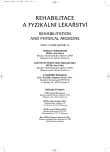Motivation of Locomotor Activity – Results of a Study Performed in Fitness Center Visitors
Authors:
D. Stackeová
Authors‘ workplace:
Katedra fyzioterapie, Fakulta tělesné výchovy a sportu UK, Praha
vedoucí katedry doc. PaedDr. D. Pavlů, CSc.
Published in:
Rehabil. fyz. Lék., 15, 2008, No. 1, pp. 22-26.
Category:
Original Papers
Overview
This article offers results of research on fitness motivation. The first part is focused on primary, the second part on secondary motivation. The experimental group was created by fitness clients (50 persons in the first part, 100 persons in the second part). We used verbal questionnaire that we created ourselves.
#Primary motivation:
the main motive was losing weight by woman, losing or puting on weight by men. Health and conditional motives are more important for men too.
Secondary motivation:
for the most of respondents is still the most important motiv changing their body (losing weight, puting on weight, body shaping). For 20% of them is the most important motiv “to work on myself, get better”. Psychological motives (I have better mood after exercise, need of exercise) are more important for this group.
Key words:
fitness, exercise psychology, fitness motivation
Sources
1. FIALOVÁ, L.: Body image jako součást sebepojetí člověka. Praha, Karolinum, 2001.
2. WEINBERG, R. S., GOULD, D.: Foundations of sport and exercise psychology. USA, Human Kinetics, 1995.
Labels
Physiotherapist, university degree Rehabilitation Sports medicineArticle was published in
Rehabilitation & Physical Medicine

2008 Issue 1
- Hope Awakens with Early Diagnosis of Parkinson's Disease Based on Skin Odor
- Deep stimulation of the globus pallidus improved clinical symptoms in a patient with refractory parkinsonism and genetic mutation
-
All articles in this issue
- Viscoelastic Properties of Fibrous Connective Tissue and Manual Treatment
- Vibration: Neurophysiological Aspects and Possibilities of Clinical Application
- Recognize of Motor Disorders in First Year Life - Sensitivity and Specificity of Position Reactions
- Motivation of Locomotor Activity – Results of a Study Performed in Fitness Center Visitors
- Active Life Style and its Changes in Patients with Chronic Low-Back Pain
- Rehabilitation & Physical Medicine
- Journal archive
- Current issue
- About the journal
Most read in this issue
- Viscoelastic Properties of Fibrous Connective Tissue and Manual Treatment
- Vibration: Neurophysiological Aspects and Possibilities of Clinical Application
- Active Life Style and its Changes in Patients with Chronic Low-Back Pain
- Recognize of Motor Disorders in First Year Life - Sensitivity and Specificity of Position Reactions
